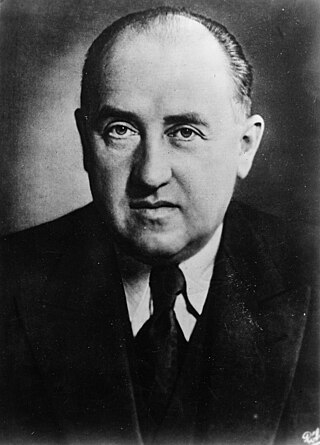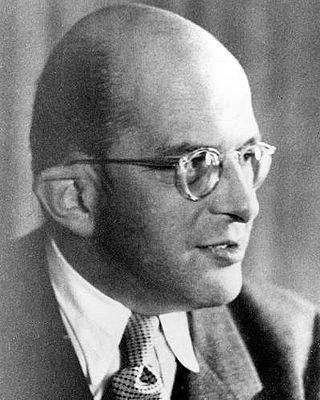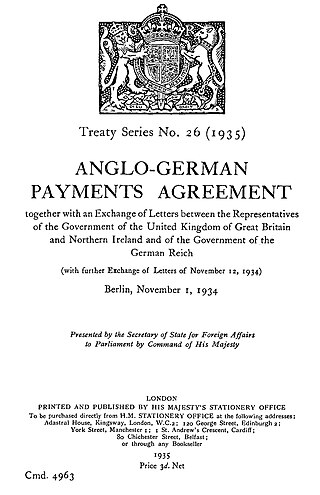Related Research Articles

Walther Immanuel Funk was a German economist and Nazi official who served as Reich Minister for Economic Affairs (1938–1945) and president of Reichsbank (1939–1945). During his incumbency, he oversaw the mobilization of the German economy for rearmament and arrangement of forced labor in concentration camps. After the war he was tried and convicted as a major war criminal by the International Military Tribunal at Nuremberg. Sentenced to life in prison, he remained incarcerated until he was released on health grounds in 1957. He died three years later.

Friedrich "Fritz" Thyssen was a German businessman, born into one of Germany's leading industrial families. He was an early supporter of the Nazi Party but later broke with it.

Hjalmar Schacht was a German economist, banker, politician, and co-founder of the German Democratic Party. He served as the Currency Commissioner and President of the Reichsbank under the Weimar Republic. He was a fierce critic of his country's post-World War I reparations obligations. He was also central in helping create the group of German industrialists and landowners that pushed Hindenburg to appoint the first NSDAP-led government.

Hans Luther was a German politician and Chancellor of Germany for 482 days in 1925 to 1926. As Minister of Finance he helped stabilize the Mark during the hyperinflation of 1923. From 1930 to 1933, Luther was head of the Reichsbank and from 1933 to 1937 he served as German Ambassador to the United States.

The Reichsmark was the currency of Germany from 1924 until the fall of Nazi Germany in 1945, and in the American, British and French occupied zones of Germany, until 20 June 1948. The Reichsmark was then replaced by the Deutsche Mark, to become the currency of West Germany and then all of Germany after the 1990 reunification. The Reichsmark was used in the Soviet occupation zone of Germany until 23 June 1948, where it was replaced by the East German mark. The Reichsmark was subdivided into 100 Reichspfennig. The Mark is an ancient Germanic weight measure, traditionally a half pound, later used for several coins; Reich comes from the official name for the German state from 1871 to 1945, Deutsches Reich.

The Rentenmark was a currency issued on 15 November 1923 to stop the hyperinflation of 1922 and 1923 in Weimar Germany, after the previously used "paper" Mark had become almost worthless. It was subdivided into 100 Rentenpfennig and was replaced in 1924 by the Reichsmark.

The Hitler cabinet was the government of Nazi Germany between 30 January 1933 and 30 April 1945 upon the appointment of Adolf Hitler as Chancellor of the German Reich by President Paul von Hindenburg. It was contrived by the national conservative politician Franz von Papen, who reserved the office of the Vice-Chancellor for himself. Originally, Hitler's first cabinet was called the Reich Cabinet of National Salvation, which was a coalition of the Nazi Party (NSDAP) and the national conservative German National People's Party (DNVP). The Hitler cabinet lasted until his suicide during the defeat of Nazi Germany. Hitler's cabinet was succeeded by the short-lived Goebbels cabinet, with Karl Dönitz appointed by Hitler as the new Reichspräsident.
The Four Year Plan was a series of economic measures initiated by Adolf Hitler in Nazi Germany in 1936. Hitler placed Hermann Göring in charge of these measures, making him a Reich Plenipotentiary (Reichsbevollmächtigter) whose jurisdiction cut across the responsibilities of various cabinet ministries, including those of the Minister of Economics, the Defense Minister and the Minister of Agriculture. The Four Year Plan was part of the alternative governmental structure created by Hitler and the Nazi Party, which included entities such as Organisation Todt and the unification of the Schutzstaffel (SS) and the German police forces, including the Gestapo, under Heinrich Himmler.
A Mefo bill, named after the company Metallurgische Forschungsgesellschaft, was a promissory note used for a system of deferred payment to finance the Nazi German government's programme of rearmament, devised by the German Central Bank President, Hjalmar Schacht, in 1934. These Bills acted as a highly liquid form of debt for the Nazi government, allowing them to rearm under the Versailles Treaty.

Erwin Planck was a German politician, and a resistance fighter against the Nazi regime.

The government of Nazi Germany was a totalitarian dictatorship governed by Adolf Hitler and the Nazi Party according to the Führerprinzip. Nazi Germany was established in January 1933 with the appointment of Adolf Hitler as Chancellor of Germany, followed by suspension of basic rights with the Reichstag Fire Decree and the Enabling Act which gave Hitler's regime the power to pass and enforce laws without the involvement of the Reichstag or German president, and de facto ended with Germany's surrender in World War II on 8 May 1945 and de jure ended with the Berlin Declaration on 5 June 1945.

Like many other nations at the time, Germany suffered the economic effects of the Great Depression, with unemployment soaring after the Wall Street Crash of 1929. When Adolf Hitler became Chancellor of Germany in 1933, he introduced policies aimed at improving the economy. The changes included privatization of state-owned industries, import tariffs, and an attempt to achieve autarky. Weekly earnings increased by 19% in real terms from 1933 to 1939, but this was largely due to employees working longer hours, while the hourly wage rates remained close to the lowest levels reached during the Great Depression. In addition, reduced foreign trade meant rationing of consumer goods like poultry, fruit, and clothing for many Germans.

The Secret Meeting of 20 February 1933 was a secret meeting held by Adolf Hitler 25 industrialists at the official residence of the President of the Reichstag Hermann Göring in Berlin. Its purpose was to raise funds for the election campaign of the Nazi Party.

German rearmament was a policy and practice of rearmament carried out by Germany from 1918 to 1939, in violation of the Treaty of Versailles which required German disarmament after WWI to prevent it from starting another war. It began on a small, secret, and informal basis shortly after the treaty was signed, but was openly and massively expanded after the Nazi Party came to power in 1933.
Öffa bills or job-creation bills were promissory notes created in 1932 by the German government. They were aimed at additional fund-raising for public building initiatives and later for job creation schemes.
Rudolf Brinkmann was a German economist and banker who rose to become a State Secretary in the Reich and Prussian Ministry of Economics and the Vice President of the Reichsbank in Nazi Germany. After only about a year in office, he had a nervous breakdown, was hospitalized for a severe psychiatric condition and relieved of his posts.
The Judenvermögensabgabe was an arbitrary special tax imposed on German Jews under the Nazi dictatorship. The tax was only a part of a larger series of actions taken by the Nazis to systematically plunder Jewish assets.
The Deutsche Golddiskontbank was a state-owned special bank founded in 1924 to promote German export industry by financing raw material imports. It was liquidated in 1945.
Friedrich "Fritz" Reinhart was a German bank executive, financier and supporter of the Nazi Party. He was the chief executive officer of the Commerz- und Privat-Bank from July 1934 until his death in October 1943.

The Anglo-German Payments Agreement was a bilateral agreement signed on 1 November 1934 between the governments of the United Kingdom and Nazi Germany. The agreement aimed to address German debt obligations, particularly in relation to the Dawes and Young plans as part of World War I reparations, and set a framework for trade relations between the two countries during a period of increasing political tension in Europe. The agreement remained in place until the outbreak of World War II in 1939.
References
- ↑ "MEFO". World News (WN) Network . Retrieved 21 October 2012.
- ↑ Giacomo Preparata, Guido (1 December 2002). "Hitler's Money: The Bills of Exchange of Schacht and Rearmament in the Third Reich". American Review of Political Economy. 1 (1): 21.
- ↑ Martin Kitchen, A History of Modern Germany 1800–2000, Maden, MA, Blackwell Publishing, 2006, p. 284
- ↑ Harrison, Mark (26 June 2000). The Economics of World War II: Six Great Powers in International Comparison (1998 ed.). Cambridge, United Kingdom: Cambridge University Press. p. 139. ISBN 0-521-62046-5.
- ↑ Guillebaud, C W (1939). The Economic Recovery of Germany from 1933 to the Incorporation of Austria in March 1938 (1939 ed.). Macmillan and Co. p. 303.
- ↑ Martin Kitchen, A History of Modern Germany 1800–2000, Maden, MA, Blackwell Publishing, 2006, p. 284
- ↑ "The Nuremberg Trial Proceedings, Vol.13". The Avalon Project . Retrieved 29 June 2015.